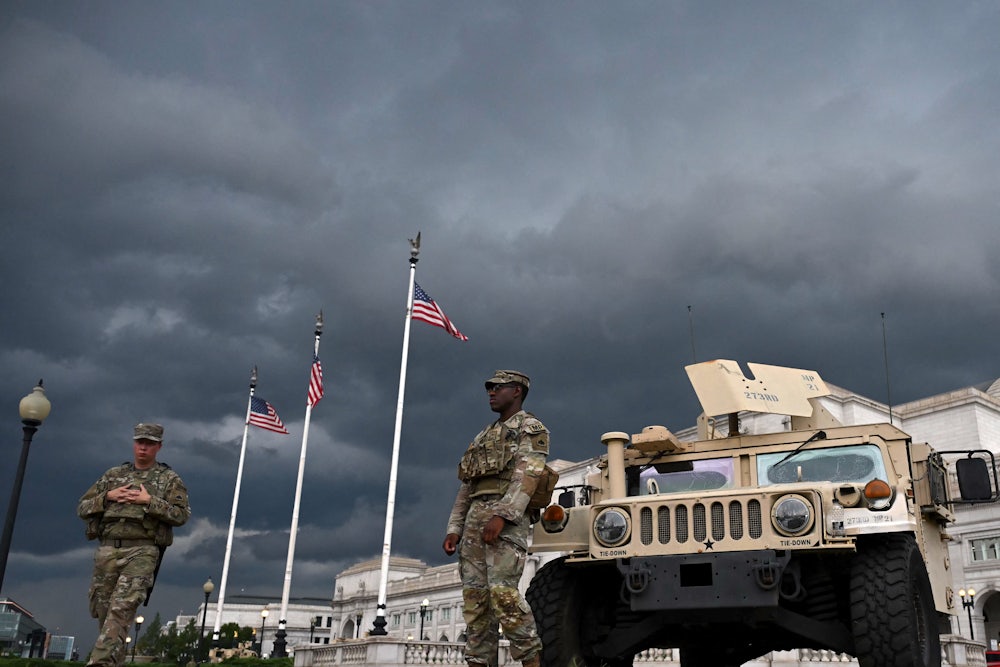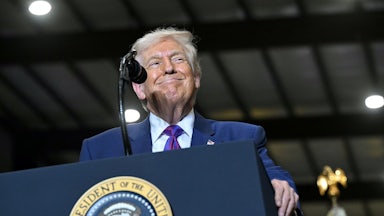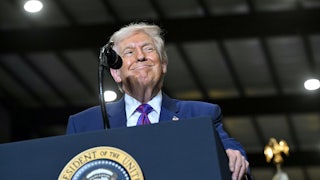As far as signifiers of fascist takeovers go, it’s hard to get more ham-fisted than a joint paramilitary-military occupation of the nation’s capital in the precise way that government officials have explicitly said is a proof of concept for takeovers in other bastions of political opposition.
The Trump administration’s takeover of the D.C. police force—escalating to a contested attempt to fully replace the commissioner and unilaterally rescind the district’s sanctuary laws—along with the deployment of federal agents and the National Guard to the District of Columbia, has both franchised and built on the model so recently pioneered in Los Angeles. That in itself was one more in a line of authoritarian steps the government has taken, ranging from relatively invisible moves, such as pooling data to create de facto dossiers on everyone in the country, to very visible shows of force, like arresting activists and elected officials.
There is one new dimension to the D.C. crackdown, though: Unlike practically everything I just mentioned, it is not being done under the guise of Trump’s promised mass deportation campaign, but rather rests on the pretext that crime in the city is out of control to the extent that it effectively requires an invasion. This is a relatively subtle distinction, perhaps a distinction without a difference, but it’s notable in the sense that it represents one more step in the ongoing project to inch the national security and surveillance state out of the extremes of the out-groups, and ever closer to pervasive in everyone’s lives (somewhat comically telegraphed by the most prominent surveillance firm being named after an evil all-seeing orb).
This is, it brings me no joy to point out, exactly what longtime observers of these interlocking systems said was going to happen; the tools built ostensibly to be directed outward at the foreigners—abroad and at home—were always going to be too tempting for the authoritarians not to eventually direct them at the rest of us. I have previously called immigration enforcement the “tip of the spear” for an outward expansion out of the police-surveillance state.
Journalist Spencer Ackerman’s book Reign of Terror was largely rooted in arguing that the post-9/11 forever-war posture would, inevitably, make its way back to Main Street. Almost as if to directly confirm Ackerman’s thesis, Republican House Oversight Chair Representative James Comer went on propaganda network Newsmax and said, “We spend a lot on our military. Our military has been in many countries around the world for the past two decades walking the streets trying to reduce crime. We need to focus on the big cities in America now.”
It’s worth noting that every single tool that Trump has employed in his effort to expand the state’s authoritarian reach is one that existed prior to his first term—and all of these tools have been bolstered over years on the strength of bipartisan consensus. What Trump is doing is not some unexpected misuse of the awesome capabilities and powers that we have granted to the military national security state, but rather its natural endpoint. Everything is working as it was designed to do. As the dedicated team at 404 Media has been exhaustively documenting for months, practically every public or private surveillance tool and authority that exists at every level of government has been tapped to prosecute the administration’s power grab in the final melding of a full-on authoritarian apparatus.
It is a marker of a continued failure to grasp this—or, perhaps, a refusal to do so—that journalists, commentators, and political figures are now litigating the exact severity and political response to the rates of crime in D.C. I hate to be the bearer of bad news, but this is not fundamentally about crime, just as it was not about immigration; there is no level of public safety at which Trump would not have taken these steps because this is about power. Early reports of this deployment point to random checkpoints and patrols, indiscriminate arrests, and federal agents taking down banners criticizing them, as opposed to any actual investigative or policing work, surprising only the dumbest of pundits.
The point here isn’t to take a victory lap. Those of us who’ve been right about this are not particularly happy about the prescience we’ve manifested. The point is that we can’t establish a system in which all the incentives point in an authoritarian direction, and have few restraints and no consequences for abuse, then be shocked when we end up here. We are now staring down the barrel of a bona fide, definitional fascist takeover of the United States, and what remaining pro-democracy leaders and institutions we have need to be thinking hard about not only how to effectively stall out and countermand this movement while they still have some relative power but how to avoid the litany of failures that fed it.
The most basic and necessary realization is that the idea of us returning to some pre-MAGA status quo and reestablishing an identical political society to the one we had before is a dangerous fantasy. If we somehow manage a peaceful—or, in the worst case, a not-so-peaceful—transition of power back to a broadly democratic system of government with shared power and legal constraints, then get right back to giving police departments military arsenals and keeping immigrants in a pseudo state of exception and so on, we are really only setting the table for the next fascist figurehead.
Words like crime and drugs and protecting the children have to stop short-circuiting nominally liberal leaders into abandoning their rationality, principles, and ability to look a few steps down the road. No one wants rampant crime and human trafficking and all the other horrors conservatives have found useful to pretend to care about while actively fomenting, which is why liberal leaders should insist on abandoning demonstrably ineffective approaches like giving tanks to local police departments. That also means cutting off the flow of money and replacing it with heavy regulation for Palantir, Flock, and their ilk—firms that exist primarily to facilitate pervasive monitoring for nebulous and ever-shifting security reasons that are always waiting for the next authoritarian raison d’être.
This necessitates real accountability for acting outside the bounds of our social contract. I don’t mean the petty crimes and minor civil immigration violations that have so incensed Trump, but the misuse of real power, which should be far more offensive to us. We should be naming federal judges who will embrace contempt proceedings against federal officials who go outside the already expansive bounds of the law, instead of effectively allowing them to spit in the judiciary’s face; judges who will take aim at qualified immunity and be much more friendly to individual causes of action against official abuses, as opposed to chipping away at them.
This sequence of events also demonstrates that we have way too much baked into our laws at the local, state, and federal levels that is easily co-opted by authoritarians for their own purposes, including the law allowing a presidential takeover of the D.C. police force itself. The key lesson is this: If we leave all the elements of an authoritarian state in place, one will be assembled, whatever the rationale happens to be.










